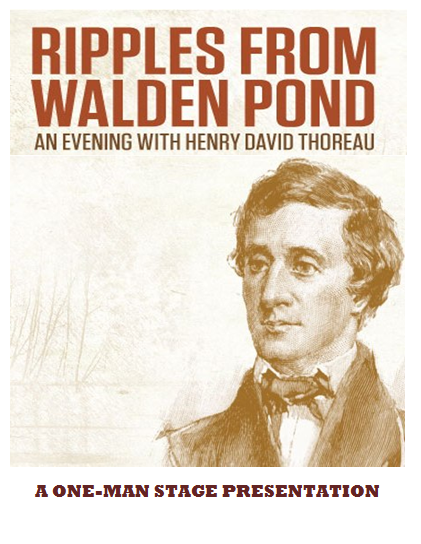Ripples From Walden Pond:
An Evening With Henry David Thoreau
Frequently Asked Questions
How did Ripples From Walden Pond come to be? Why did you want to bring Henry David Thoreau to the stage?
What are the biggest challenges in adapting literature to the Stage?
How were you able to reconstruct Thoreau’s character and personality?
Is Ripples from Walden Pond suitable for school presentation?
How long did it take to write Ripples From Walden Pond?
How did Ripples From Walden Pond come to be? Why did you want to bring Henry David Thoreau to the stage?
Henry Thoreau and I have been friends for a long time. When I was a young man, I loved him for what he valued, and for his perspective. Now that I'm a not-so-young man I love him for his youthful exuberance, for the passion with which he embraces everything he cherishes and believes.
I have always been drawn to the one-man theatrical format, its simplicity and austerity, the way it takes everything I enjoy about theater and pares it down to its foundational elements. Ripples From Walden Pond can be staged with only a chair, a table, a podium, and a few books, and it is that paring down that brings into high relief the magic of theater. It allows you to experience with singular clarity what theater is for, which is to edify, uplift, and ennoble us. That's what all the arts are for. Henry Thoreau was the perfect subject to present in the one-man format because his entire life was about simplicity; about paring life down to its absolute essentials. I think the one thing that Henry and I would agree on, more than anything else, is that we write not to make a living, but to make a difference. Henry Thoreau was a man trying to make a difference, and so am I.
What are the biggest challenges in adapting literature to the Stage?
There are two mountains to climb in adapting literature to the stage.
The first is the task of compression. In his forty-four years, Henry Thoreau produced a wide body of work: travel books, poetry, essays, a fourteen-volume journal, a fat volume of correspondence, and of course his masterpieces "Resistance to Civil Government" and Walden. He enjoyed the friendship or acquaintance of some of the most remarkable people of his day, including Ralph Waldo Emerson, Nathaniel Hawthorne, Walt Whitman, John Brown, Louisa May Alcott and her father Bronson.
In portraying a life so varied, so fruitful, and so fully-lived in a ninety-minute presentation, inevitably some things must be left behind. I have made choices less from my own preferences than from what is most suitable and relevant to a modern audience. Nathaniel Hawthorne, an astute observer who was neither easily impressed nor prone to hyperbola, said Thoreau was a healthy and wholesome man to know. It is my hope that when an audience has seen Ripples From Walden Pond they will want to know Henry Thoreau better.
The second task we may sum up in Thoreau's words: Simplicity, simplicity, simplicity. Henry Thoreau's prose is muscular, dense, stylistically complex, littered with classical allusions. His vocabulary is immense. When reading Thoreau, we have the luxury of being able to stop, ponder, chew and digest, just as he intended we should. In a theatrical presentation, the audience does not have this luxury. If an audience member has to pause to consider what has just been said, they do not hear what is being said, and the actor and playwright have lost them. Because Thoreau is too fine a craftsman to be reduced to sound bites, this also means the text must be painstakingly punctuated, and that punctuation strictly adhered to in performance, to allow those brief pauses wherein the audience may ponder and absorb what they have heard.
How were you able to reconstruct Thoreau's character and personality?
In all great books you will find a personality. That is, in fact, one of the things that stamps and defines a great book. There is a unique narrative voice that you recognize each time you return to them. Henry Thoreau's voice rings through all of his works like music. Perhaps music is the best analog, for language is very much like music. Think of Mozart. Once you've heard a Mozart string quartet, even if you know nothing about music you'll hear a musical signature, a light-hearted bounce that, once identified, you can hear in everything that Mozart wrote (with the exception of his Requiem). Great literary voices are like that. They have a musical signature, and that is the key to reconstructing and reproducing their character and personality.
Is Ripples from Walden Pond suitable for school presentation?
Yes. It was in fact written with audiences of all ages in mind; thus it contains none of the so-called "mature themes" and "adult language" which are the hallmark of the barren artistry so endemic to modern theater. In its themes of personal responsibility, justice, and what it means to have a sane and healthy hierarchy of values, it embraces a wide range of study: literature, ecology, history, economics, politics. It is perfectly suited to all age groups from Middle School on. Teenage audiences respond to Henry Thoreau particularly well, as he was a man who marched to the beat of a different drummer, and struggled for years to define who he was and to find his place in the world.
Ripples from Walden Pond is available for performance in two versions. The original, intended for traditional theatre performance, has a running time of about ninety minutes, plus intermission: Act I, about fifty minutes, Act II about forty. There is a shorter, one-act version of about fifty-five minutes, suitable for presentation during a school day.
How long did it take to write Ripples From Walden Pond?
The first draft of Ripples From Walden Pond was written in the summer of 2007. The final performance draft, after presentation to test audiences and audience feedback, was completed in 2012. There were about twenty drafts in all. The revisions and original source material fill two three-inch binders. The final draft is thirty-four pages.


